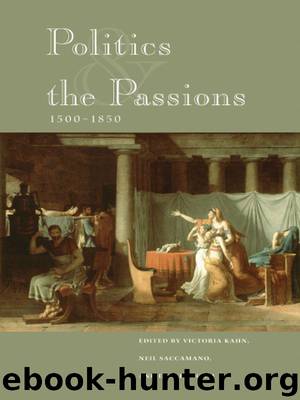Politics and the Passions, 1500-1850 by Kahn Victoria; Saccamano Neil; Coli Daniela

Author:Kahn, Victoria; Saccamano, Neil; Coli, Daniela
Language: eng
Format: epub
Publisher: Princeton University Press
Published: 2009-03-17T16:00:00+00:00
Parting with Prejudice
HUME, IDENTITY, AND AESTHETIC UNIVERSALITY
Neil Saccamano
Nothing can oppose or retard the impulse of passion, but a contrary impulse. . . .We speak not strictly and philosophically when we talk of the combat of passion and of reason. Reason is, and ought only to be the slave of the passions, and can never pretend to any other office than to serve and obey them. As this opinion may appear somewhat extraordinary, it may not be improper to confirm it by some other considerations.1
David Hume’s well-known critique of the sovereignty of reason in human life is “extraordinary” not only because he reverses the positions of master and slave by bestowing authority on the passions, but also because he declares the traditional discourse of the passions to be unphilosophical in its use of the metaphor of combat. “ ’[T]is impossible that reason and passion can ever oppose each other, or dispute for the government of the will and actions,” since emotions, feelings, sentiments, or affections—the passions, in Hume’s broad sense of the term—have unquestionable jurisdiction over praxis (T, 416). Hume develops his critique of the misleading figure of dispute in this tradition by rather dramatically exemplifying the social implications of his novel opinion: “’Tis not contrary to reason to prefer the destruction of the whole world to the scratching of my finger” or “for me to chuse my total ruin, to prevent the least uneasiness of an Indian or person wholly unknown to me. . . . ’tis not the passion, properly speaking, which is unreasonable, but the judgment [accompanying it]” (T, 416). There can be no contradiction between reason and passion for Hume because the passions, which alone produce actions arising from a propensity to pleasure and avoidance of pain, have nothing to say to the discourse of reason, which addresses the truth and falsehood of judgments. What Hume understands to be his extraordinary contribution to moral philosophy consists, somewhat paradoxically, in speaking to the sovereignty of unspeakable passions in common life.
Of course, as many philosophical studies of Hume have pointed out at least since Norman Kemp Smith and as we shall also have occasion to investigate in this essay, Hume’s maxim here concerning the proper enslavement of reason is polemical and needs to be qualified by his more intricate analyses of the role of critical reflection in the domain of praxis.2 But this famous passage bears reciting to remind ourselves that what is at stake in the passions for Hume is a matter of life and death—my own as well as that of others, particularly strangers, the world of persons “wholly unknown to me.” For Hume, we should recall, moral philosophy is another name for the science of human nature and comprehends the sciences of logic, which explains our “reasoning faculty and the nature of our ideas”; morals (in the sense of ethics) and criticism, both of which “regard our tastes and sentiments”; and politics, which considers “men as united in society and dependent on each other.”3 In the
Download
This site does not store any files on its server. We only index and link to content provided by other sites. Please contact the content providers to delete copyright contents if any and email us, we'll remove relevant links or contents immediately.
| African | Asian |
| Australian & Oceanian | Canadian |
| Caribbean & Latin American | European |
| Jewish | Middle Eastern |
| Russian | United States |
4 3 2 1: A Novel by Paul Auster(12375)
The handmaid's tale by Margaret Atwood(7757)
Giovanni's Room by James Baldwin(7330)
Asking the Right Questions: A Guide to Critical Thinking by M. Neil Browne & Stuart M. Keeley(5759)
Big Magic: Creative Living Beyond Fear by Elizabeth Gilbert(5756)
Ego Is the Enemy by Ryan Holiday(5415)
The Body: A Guide for Occupants by Bill Bryson(5082)
On Writing A Memoir of the Craft by Stephen King(4935)
Ken Follett - World without end by Ken Follett(4723)
Adulting by Kelly Williams Brown(4566)
Bluets by Maggie Nelson(4548)
Eat That Frog! by Brian Tracy(4526)
Guilty Pleasures by Laurell K Hamilton(4439)
The Poetry of Pablo Neruda by Pablo Neruda(4097)
Alive: The Story of the Andes Survivors by Piers Paul Read(4020)
White Noise - A Novel by Don DeLillo(4006)
Fingerprints of the Gods by Graham Hancock(3996)
The Book of Joy by Dalai Lama(3976)
The Bookshop by Penelope Fitzgerald(3844)
